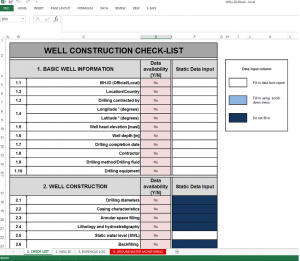 |
Container-based Toilets with Solid Fuel Briquettes GuidelinesThese Best Practice Guidelines were developed by Sanivation, a private sanitation company based in Kenya under UNHCR’s “Waste to Value” Project, funded by the Bill and Melinda Gates Foundation. The Guidelines are based on ongoing operational research in Kakuma Refugee Camp in partnership with UNHCR and the Norwegian Refugee Council (NRC), and will be update at the end of the Project in 2019.
|
 |
UNHCR Urine Diverting Dry Toilet (UDDT) Standard Operating ProceduresDouble vault Urine Diversion Dry Toilets (UDDT) can be used as an alternative to pit latrines in refugee camps. They utilise two chambers for faeces, one of which is in use whilst the other is full and drying so that it can be safely disposed of after an appropriate period of time.
|
 |
WASH Country Strategy / Operational Plans TemplateWhere required, UNHCR and WASH actors should work together to develop a country level refugee WASH strategy document that clearly describes the refugee context and the baseline WASH situation, along with short, medium and long-term strategies for each of the WASH sub-sectors. This template can be used to help produce a short and concise Country level WASH Strategy. It includes a phased approach, HR requirements and site-level Operational Plans. |
 |
Hygiene Promotion Guidelines (UNHCR, 2017)These guidelines provide additional support and information on designing and implementing hygiene promotion programmes or elements of hygiene promotion in the programmes of other sectors. They should be used in conjunction with the UNHCR WASH Manual and the summary guidance in the Hygiene Promotion Chapter of this manual. |
 |
F-300/2017a UNHCR Well Construction DocumentationPublisher: UNHCR Year: 2017 Description: UNHCR has developed a standard excel-based form that should be used to capture all the important information during well construction. The excel file can be downloaded by following the link at the bottom of this page. Once you have downloaded the excel file, you can watch the explanatory videos. Three […]
|
 |
Rapid Methods for Assessing Water, Sanitation and Hygiene (WASH) Services in Emergency Settings (UNHCR, 2017b)Publisher: UNHCR Year: 2017 Description: This document evaluates various sampling strategies that can be used during the emergency phase to estimate the status of WASH services in refugee camps or settlements. The working paper presents the results of statistical analyses carried out on real data from Ethiopia. The objective of the study was to evaluate […] |
 |
Rapid Methods for Assessing Water, Sanitation and Hygiene (WASH) Services in Emergency Settings (UNHCR, 2017a)This document describes UNHCR’s methodology for conducting rapid WASH household assessments in refugee settings. |
 |
UNHCR WASH MANUAL: Programme GuidanceThe UNHCR WASH Manual: Programme Guidance, provides practical guidance for WASH programmes in refugee settings.
|
 |
OG804/2016a Cash Based Interventions for WASH Programmes in Refugee Settings (UNHCR, 2016)This report is based on a desk-based review of secondary data, comprising published material as well as grey literature, supplemented with key informant interviews for programmes that lacked documentation. Section One summarises the current use of CBI in WASH programming. Section Two summarises the best practices and lessons learned including challenges faced, drawing on evidence from the project examples found. Section Three provides recommendations and best practice guidance for use of CBI in refugee settings. Section Four details existing tools and guidance.
|
 English
English